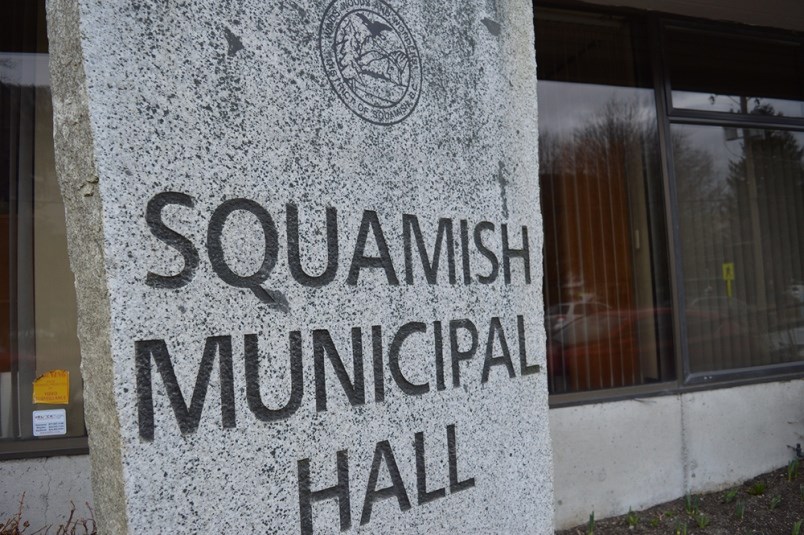District of Squamish councillors are hoping resolutions they put forth before Lower Mainland
municipalities will serve as a bullhorn to the province about several matters critical to town.
This would be regional transit, policing, housing, resource roads and climate change.
During their meeting on Feb. 25, elected officials approved several motions they would like to put forth to the Lower Mainland Local Government Association, or LMLGA.
Resolutions passed by the association then stand a higher chance of eventually being passed by the Union of B.C. Municipalities, or UBCM, later in the year.
While these resolutions don’t have legislative teeth, they are often used by municipalities as a tool to lobby the province for change.
To this end, Squamish’s council has crafted several motions that they hope will eventually put issues affecting the town — and local governments — on the province’s radar.
A motion on regional transit, which has been a long-standing wish for many people in town, was brought forth by Coun. Jenna Stoner.
Stoner’s motion initially tried to lobby the province for the ability to create a motor fuel tax. However, council made changes to the ask, after Mayor Karen Elliott pointed out that there has been a great deal of difficulty finding provincewide support for a motor fuel tax.
Elliott recommended avoiding the motor fuel tax, and instead using language that would still get to the heart of the issue, which is creating a “funding mechanism” to make regional transit happen. That mechanism doesn’t necessarily have to be a fuel tax.
“Rather, focus it on getting a funding model developed between the province and BC Transit that can be applied to regions,” said Elliott.
This funding mechanism would also include interested municipalities and regions, as well as drivers and fare-payers, she said.
The resolution also urges this funding mechanism to be available in time for the 2021 budget cycle.
Stoner made the change and the regional transit motion was unanimously approved — save for the vote of Coun. Doug Race — to send to the LMLGA.
Race was absent from the meeting.
Coun. John French’s motion was aimed at helping to address the housing crisis by allowing for tiny homes to gain legitimacy on the markets.
While tiny homes are already being constructed in some parts of Squamish, French’s resolution points out that some features are still not permissible in the B.C. Building Code. As a result, this could make them inaccessible in some cases.
French’s resolution urges the province to review the building code and make accommodations in the regulations to allow for tiny homes. His resolution was approved unanimously.
Elliott brought forth a motion that aims to address the lack of municipal policing resources.
Her resolution states that municipalities have experienced increased criminality and road safety issues as a result of industrial or tourism hotspots outside of local government boundaries.
There haven’t been any increases in provincial RCMP presence to address these issues, even though they’ve been spurred by provincial tourism promotion and industrial project approvals, the resolution says.
As a result, the increased workload is being dumped on municipal police.
To address this, Elliott’s motion asks the province to start paying more of its share. To do so, it asks the Minister of Public Safety and Solicitor General of B.C. to develop a funding model that increases provincial RCMP as tourism, industry and rural populations grow.
This was approved unanimously.
Coun. Eric Andersen’s resolution highlights the importance of natural resource roads in places like Squamish.
Currently, the use of resource roads are no longer for just logging or mining. They’re becoming a big part of recreation, search and rescue, among other things.
Andersen’s resolution notes the method for managing resource roads has deficiencies in protocols, classifications and definitions.
As a result, it calls for policy housekeeping measures that would clean these issues up.
For example, something like the Mamquam River Forest Service Road still hasn’t been defined as having a tourism use, despite its popularity with recreationalists, Andersen noted.
Andersen’s motion was also approved unanimously.
Coun. Chris Pettingill tried to put forth a motion that would ask the province to create climate reduction targets similar to the B.C. Energy Step Code.
The difference here would be that it would not apply only to new buildings being made, but to a municipality as a whole, Pettingill said.
He also proposed a resolution that would ask the province to allow municipalities to give environmentally-friendly properties a tax break.
Council decided to defer approval on these motions, as details and wording still needed to be hashed out. It’s expected to be discussed again at a later date. Resolutions that were approved at this meeting will be presented to the LMLGA, where they will be either endorsed or rejected.



